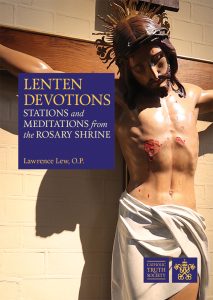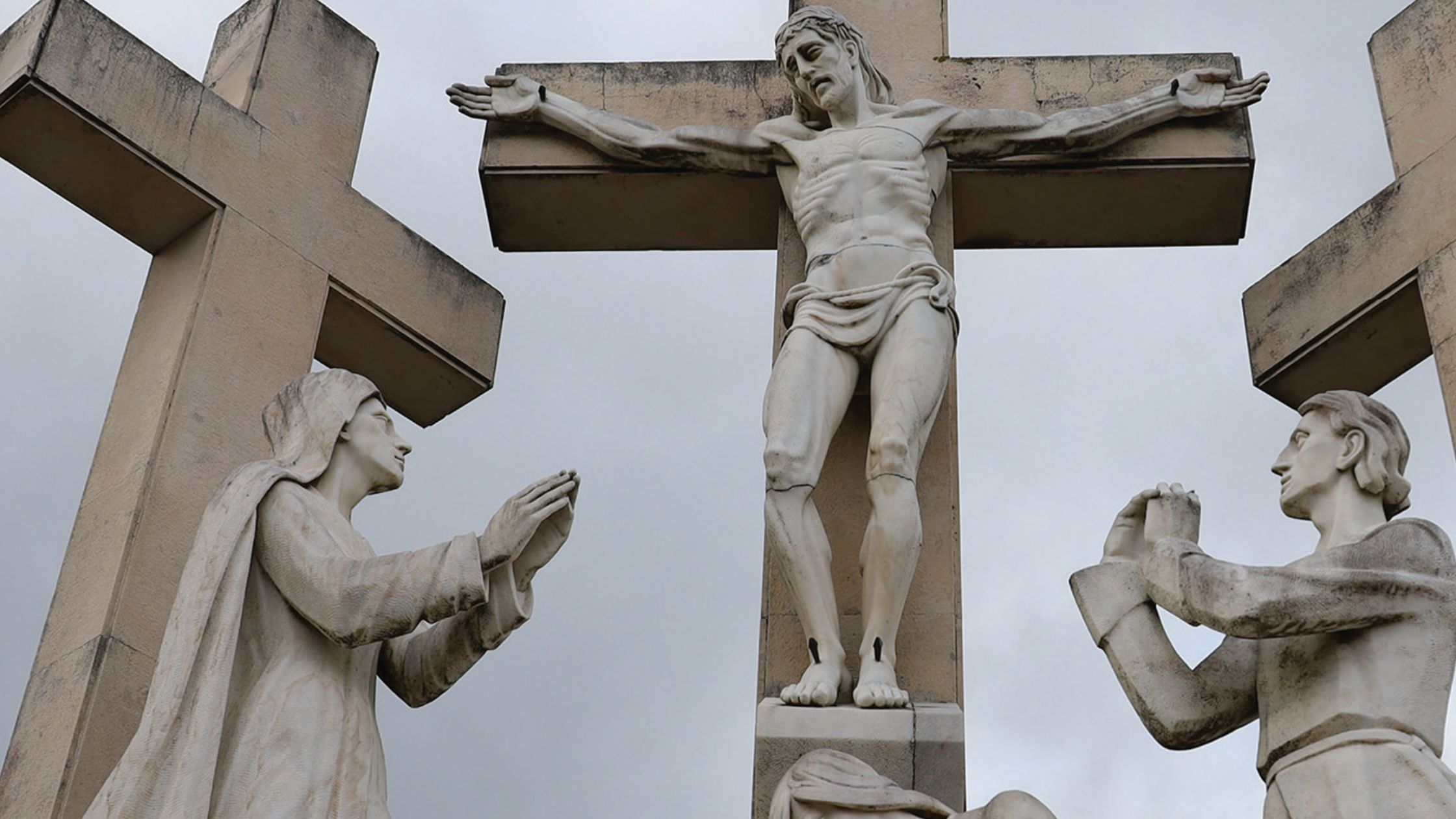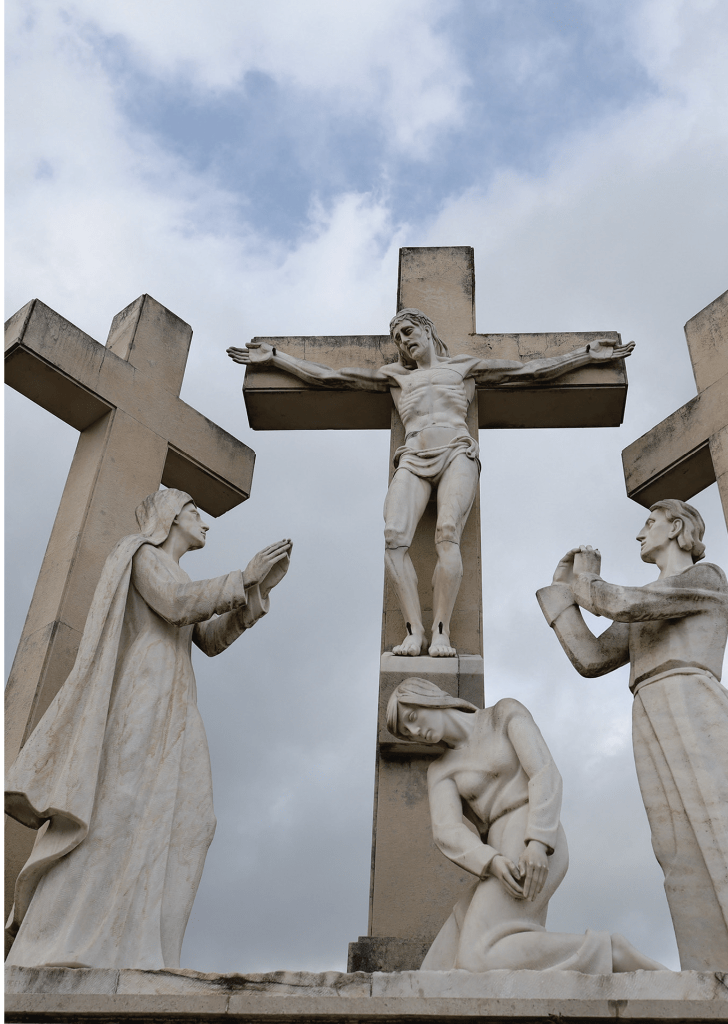The Seven Last Words of Our Lord have, from the sixteenth century, been the subject of meditations of Good Friday. Fr Lawrence Lew OP’s set of reflections, the first of which is presented here, was first preached in Holy Week of 2022, during the Rosary Shrine’s annual “Holy Week Retreat”.
The third word (see Jn 19:26, 27):
To Mary, his mother:
Woman, behold your son.
To John:
Behold your mother.
They say that you cannot choose your family, and this is certainly true if we are speaking of our biological birth and our DNA. We are related by blood to a certain family, born of our mother and father. In the natural order of things, we are born of our parents as sheer gift, for parents also cannot choose the kind of child they have, despite the flawed attempts of contemporary eugenics and boutique surrogacy. A child is not a commodity or product (“of the will of the flesh or of the will of man”, as St John put it), and ought to be a gift of God freely and lovingly accepted by husband and wife.
God, therefore, coming into this world as man, was also born of a woman and into a family with an ancestry, as we all are. Christ need not have become man in this way, but he chose it because it is the human way and, therefore, the most fitting way for God to become man and to share our human experience. Thus, “born of woman, born under the law” (Ga 4:4), Jesus shared the bloodline of Mary, and so he was descended from Obed, and Nathan, and Zorobabel, and Boaz and Ruth, and David and Mattathias, and a whole host of other exotic names, as the Gospel of St Luke recounts. And Christ’s family tree, like all of ours, was a mix of great and noble people, some colourful characters, and some rogues and sinners, even murderers.
However, because Christ is God, unlike us he could in a unique sense choose his mother. God prepared Mary to be the Mother of God; his grace preserved her from the stain of original sin from the moment of her conception, and so Mary remained sinless throughout her life. Mary, in her sinlessness, therefore, lived as God had wanted us all to live from the very beginning, had Adam and Eve not fallen into original sin. But because our first parents abused the freedom God had given them, so now, “in the fullness of time” (Ga 4:4), God himself provides the remedy for sin by creating Mary free from sin, and then by being born of Mary, born of this very particular and unique woman. As the Catechism says: “To become the mother of the Saviour, Mary ‘was enriched by God with gifts appropriate to such a role’” (Catechism of the Catholic Church 490).
However, Mary’s role as Mother is completed only now on the cross, when Jesus gives her to the Beloved Disciple, and thus makes her Mother of the Church, mother of all who are baptised, mother of those redeemed by Christ, mother of all who truly live through the grace of Christ, our mother.
“Behold your mother,” he says; and so he gives Mary to be truly our mother. This is something that only God can do. For just as God gave us our natural, biological mothers, so now, from the cross, Christ-as-God gives us a supernatural mother who will care for us and nourish us and raise us up to maturity in the order of grace. So Christ gives to Mary the perfection of her role as the sinless Virgin Mother of the Saviour, which is that she should lead us little Christians to perfection; that she should be our intercessor in our struggle against sin; and that she should be a mediator of those graces we need so that we may grow in holiness, growing “to the measure of the stature of the fullness of Christ” (Ep 4:13). Christ’s own perfectly created and specially chosen mother is therefore given to become our mother, specially chosen for each of us too. For we too have been chosen by God – chosen, from all eternity, for friendship and a place in paradise with him.
In the Stabat Mater, which is sung at this time of year, Mary is addressed as “Mater, fons amoris”: O Mother, fount of love. As such, Mary our Mother has to teach us Christ-like charity – she shows us how to love as Christ does, and she guides us in the ways of that grace-filled love which embraces suffering and sacrifice. Thus, standing by the cross, she leads us to contemplate the sacrificial love of Jesus. With her heart pierced, she suffers with Christ, and so she teaches us to unite our own sufferings with Jesus’s. For just as our own mothers would have taught us to speak, taught us how to live, and shown us love, so Mary as Fount of Love prepares us to speak and act like her beloved son, teaching us how to live as saints now and in the life to come, guiding us in the ways of love as love will inevitably also pierce our own hearts, and showing us how we can be united to her crucified son.
As St Paul says, if I “have not love, I am nothing” (1 Co 13:2). Mary, therefore, teaches us to be something – to have love and so to become a new creation through grace. It is not surprising that St John, with whom Our Lady lived after Christ’s death, became himself a great writer and teacher of divine love. As he wrote in his first epistle: “Beloved, let us love one another; for love is of God, and he who loves is born of God and knows God” (1 Jn 4:7). He who loves is born of God. Therefore, through the theological virtue of charity given to us, and through our exercise of this virtue, by works of love, we are re-born of God. Thus, as loving Christians we have God for our father. From the cross, then, Christ ensures that we shall have Mary as our mother showing us by her example how we can better love one another; Mary schools us in charity. Jesus says to the Beloved Disciple “Behold your mother”; he tells us, if we wish to best learn the way of love, to look to Mary, to behold her as our mother.
Looking at Our Blessed Mother, what shall we see? We behold her deep love for Christ: following him all the way to Calvary, she willingly suffers with him. For, all who love will also have to suffer. Like Christ, who, out of the depths of his divine love, suffers greatly for sinful humanity, so too Mary stands by the cross to share in Christ’s passion, and with her sinless son she, the Immaculate One, endures suffering for the sins of humanity. St Paul says: “Love bears all things…endures all things” (1 Co 13:7). Simeon foretold that a sword would pierce Mary’s immaculate heart, for she was a woman full of compassion, full of love. We catch a glimpse of this neighbourly love and care when, at the wedding at Cana, she notices the couple’s predicament – they have run out of wine – and, to spare them social embarrassment and shame, goes to Christ and asks him to help them. Let us behold our mother, let us look always to her, the fount of love, meditating on her actions perhaps when we pray the Holy Rosary, learning from her humble example of compassion, service and love.
Let us end with the prayer that the Angel of Peace taught to the holy children of Fatima:
“My God, I believe, I adore, I hope and I love Thee! I ask pardon for those who do not believe, do not adore, do not hope and do not love Thee.”
 This reflection is extracted from our book Lenten Devotions: Stations and Meditations from the Rosary Shrine. Fr Lawrence Lew OP offers three powerful Lenten devotions: Stations of the Cross featuring photographs and meditations, the Canticle of the Passion based on words revealed to St Catherine de Ricci, and recollections on the seven last words of Jesus on the Cross.
This reflection is extracted from our book Lenten Devotions: Stations and Meditations from the Rosary Shrine. Fr Lawrence Lew OP offers three powerful Lenten devotions: Stations of the Cross featuring photographs and meditations, the Canticle of the Passion based on words revealed to St Catherine de Ricci, and recollections on the seven last words of Jesus on the Cross.
Find more powerful Lenten devotions and reflections, and support the mission of CTS, by ordering your copy of Lenten Devotions today.

